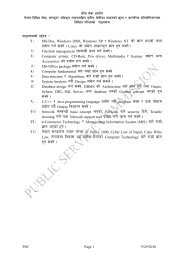Create successful ePaper yourself
Turn your PDF publications into a flip-book with our unique Google optimized e-Paper software.
agendas and recommendations for the new constitution. These include: fair and<br />
effective representation in state institutions; equality and elimination of all forms<br />
of discrimination; affirmative action, including “reservations” or quotas; secure<br />
citizenship; a secular state; political recognition of the diversity of cultures and<br />
languages; self-government through a federal type of autonomy, preferably<br />
based on language and ethnicity, etc. As in many countries, a strong sense of<br />
ethnicity is most frequently a response to discrimination and deprivation. All the<br />
“marginalized” communities have suffered in this way. For many long years,<br />
they have asked for fair representation, fair treatment, fair opportunities and<br />
their rightful place in state affairs despite Government has made efforts in the<br />
past, at a much larger scale after the April 2006 Janandolan, to reduce cultural,<br />
political and socio-economic exclusion.<br />
The Interim Constitution provides much more provisions than the Constitution<br />
of 1990 to improve the prevailing anomalies. However, various studies have<br />
shown vivid gaps across the country’s different regions and its caste and ethnic<br />
groups. These gaps become all the more pervasive with time both for the<br />
regions and the groups within them. This implies that the policies of the past<br />
have not addressed exclusion and inequalities effectively. In this context, we<br />
need to aware that equitable representation cannot alone resolve the problems<br />
of exclusion unless those who represent Nepal’s various constituencies can<br />
influence policy decisions through direct and active participation. Those now<br />
excluded are unlikely to participate as effectively as advantaged groups because<br />
of their political inexperience and shortcomings in their endowments. Inequalities<br />
in endowment not only create, but cause exclusion. Consequently, inequality<br />
and exclusion must end simultaneously in all its dimensions, including that of<br />
political action - a major feat that can come about only through consensus and<br />
cooperation.<br />
Because Nepal’s present mixed electoral system gives different caste and ethnic<br />
groups better representation than its predecessors, it has offered an opportunity<br />
to even the marginalized groups and to the smaller parties to help define the<br />
destiny of the country. This also helps foster accountability and ensure inclusion.<br />
The current mixed electoral system was designed so as to give excluded groups<br />
a greater voice in the legislature. The following tables show the representation<br />
of formally excluded groups in the Constituent Assembly, Nepal, 2008.<br />
240



![Plss[tk/LIff k|0ffnL cGtu{t gf=;'= jf ;f];/x -ck|fljlws_ b/vf:t :jLs[lt Pj+ btf{ubf ...](https://img.yumpu.com/45492178/1/190x245/plsstk-liff-k-0ffnl-cgtut-gf-jf-f-x-ck-fljlws-b-vft-jlslt-pj-btfubf-.jpg?quality=85)
![sf7df8f}+pkTosf b/vf:t ;+s ng s]Gb|](https://img.yumpu.com/44258091/1/190x135/sf7df8f-pktosf-b-vft-s-ng-sgb-.jpg?quality=85)
![cfof]u sf]a}; ÃLcf}Fjflif{s f]T;a ;DkGg](https://img.yumpu.com/37043430/1/190x245/cfofu-sfa-alcffjflifs-fta-dkgg.jpg?quality=85)


![g]kfn k|zf;g ;]jf, g]kfn n]vfk/LIf0f ;]jf, g]kfn Gofo ;]jf, g]kfn k//fi6« ;]jf / g]kfn ...](https://img.yumpu.com/37041087/1/190x245/gkfn-k-zfg-jf-gkfn-nvfk-lif0f-jf-gkfn-gofo-jf-gkfn-k-fi6a-jf-gkfn-.jpg?quality=85)
![g]kfndf u](https://img.yumpu.com/37040612/1/190x253/gkfndf-u.jpg?quality=85)

![nf]s ;]jf cfof]u](https://img.yumpu.com/37040528/1/190x245/nfs-jf-cfofu.jpg?quality=85)


![nf]s ;]jf cfof]ug]k fn Ol~hlgol/Ë ;]jf, d]6 «f]nf]h L](https://img.yumpu.com/11277666/1/184x260/nfs-jf-cfofugk-fn-olhlgol-e-jf-d6-fnfh-l.jpg?quality=85)
![nf]s ;]jf cfof]u ck|fljlws tkm{s f k|z f;g ;]jf -;fdfGo k|z f;g, n]v f / /fh:j ;d](https://img.yumpu.com/8549291/1/184x260/nfs-jf-cfofu-ck-fljlws-tkms-f-k-z-fg-jf-fdfgo-k-z-fg-nv-f-fhj-dx-.jpg?quality=85)
